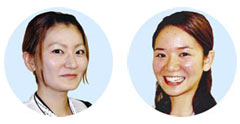Students appeal to the UN Council that concentrating U.S. bases in Okinawa is a violation of human rights

(from left) Tomomi Ganiko and Reina Uema
September 19, 2012 Kyoko Ishii Ryukyu Shimpo
Members of the Association of the Indigenous Peoples in the Ryukyus, Tomomi Ganeko and Reina Uema, will attend a meeting of the United Nation Human Rights Council to be held in Geneva from September 17 to 28. They will submit a written statement to the effect that U.S. bases in Okinawa have caused many incidents and accidents and their presence violates the human rights of locals. With regard to the Osprey aircraft deployment to Futenma Air Station, they will ask the Japanese government to respect the right of the Ryukyuan people for self-determination. They say that the government has allowed huge military bases to be established in Okinawa and that this is a mistake. The students want to convey their message to the whole world.
Many people from international NGOs and various government officials are represented on this council. In addition to letting people know about the crashes and the violent crimes by the U.S. military in the decades since the war, they will also report on the Osprey issue and the building of new bases at Henoko and Takae. It is the first time for the two students to attend the council meeting.
Ganiko, who is taking a course in Peace Studies at Keisen University Graduate School said, “Putting military bases in Okinawa like this reflects the discriminatory policy towards our people because it is a factor that has deprived us of our language and our culture through the years. I want to tell the next generation about what so many people before us have studied.”
Uema said, “Deploying the Osprey aircraft in Okinawa despite the many accidents it has been involved in is a violation of our human rights.” She hopes to share information with other participants from foreign countries.
(English translation by T&CT, Mark Ealey)
Previous Article:Learning from Quebec to commercialize Okinawan culture
Next Article:First test flights of MV-22 Osprey held in Iwakuni
[Similar Articles]
- NGO Human Rights Now criticizes Japanese government for blocking protesters in Henoko and Takae
- Gov. Onaga gives speech at UN calling for stop to US Henoko base construction
- Okinawa Governor criticizes Japanese government for understating Osprey emergency landing in North Carolina
- Okinawa Governor has difficulty accepting the Osprey to Futenma Air Station
- Forced landing of U.S. military aircraft results in unanimous decision by Uruma City Council
 Webcam(Kokusai Street)
Webcam(Kokusai Street)


